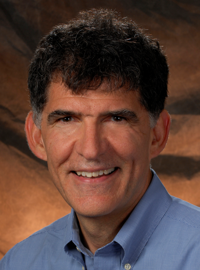
PHILADELPHIA— Two Penn Medicine faculty members, Kiran Musunuru, MD, PhD, and Daniel Rader, MD, are being honored with prestigious awards from the American Heart Association (AHA) for their achievements in cardiovascular research. Both awards will be presented during the Presidential Session on Sunday, Nov. 14, at the association's Scientific Sessions 2021.
Musunuru received the Joseph A. Vita Award in recognition of his research in therapeutic gene editing to combat cardiovascular disease. The award is given annually in honor of the late cardiovascular scientist Joseph A. Vita, MD, to recognize research that had a major impact on the field of cardiovascular biology or cardiovascular health during the last five years.
Musunuru's key achievements include discovering an LDL cholesterol regulating gene, inspiring development of multiple ANGPTL3-inhibiting drugs, using gene-edited human stem cells for disease modeling, and his pivotal work in functional genomics. In his lab, he has developed processes to use gene editing technology to permanently reduce cholesterol levels and therefore provide protection against heart attack and stroke through a one-time injection. This strategy, which he likens to a vaccination, has been very successful in mice and monkeys, and Musunuru's lab is working diligently to advance to human trials.
"I'm grateful to the American Heart Association for recognizing the ongoing efforts to translate cardiovascular gene editing from the research laboratory to clinical settings, and I'm honored to be given the opportunity to carry forward Dr. Vita's legacy," said Musunuru, a professor of Cardiovascular Medicine and Genetics; scientific director of the Penn Center for Inherited Cardiovascular Disease; and director of the Genetic and Epigenetic Origins of Disease Program at the Cardiovascular Institute at the Perelman School of Medicine at the University of Pennsylvania. "None of my recent work would have been possible without strong mentorship and staunch support, past and present, especially from Sekar Kathiresan, Daniel Rader, Thomas Cappola and the leadership of the University of Pennsylvania."

Rader is being honored with the 2021 Research Achievement Award—the AHA's highest scientific honor—in recognition of his outstanding lifetime contributions to basic and translational research in the genetics and pathophysiology of lipid disorders. Rader is the Seymour Gray Professor of Molecular Medicine, chair of the Department of Genetics, and chief of the Division of Translational Medicine and Human Genetics in the Department of Medicine at Penn. He co-directs the Penn Medicine BioBank and serves as associate director of the Institute for Translational Medicine and Therapeutics at Penn, as well as chief of the Division of Human Genetics at the Children's Hospital of Philadelphia.
Rader's research has advanced understanding of the molecular regulation of lipoprotein metabolism and the development of therapies for dyslipidemia. His research has used genetics and physiology in humans and focused on novel pathways regulating lipid and lipoprotein metabolism and atherosclerosis using genetics, and factors regulating the structure and function of high-density lipoproteins and reverse cholesterol transport.
"I have committed my career to research, investigating the fundamental basis of lipid disorders and atherosclerotic cardiovascular disease and translating that information into how we can manage and prevent these conditions more effectively," Rader said. "Ensuring that knowledge gleaned from research is used to develop new approaches to unmet medical needs provides scientists like me great incentive, hoping to continue improving patient care and patient outcomes. The greatest achievement in medicine is to contribute to our constantly evolving understanding of the complexities of human health and disease. I'm proud of my research contributions to not only science but also to cardiovascular care and prevention."






